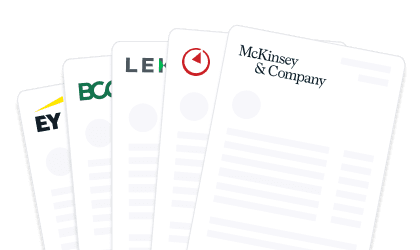Making the Leap: Transitioning from Healthcare to Management Consulting
Are you a healthcare professional looking to make a career change? This article explores the transition from healthcare to management consulting, providing valuable insights and tips to help you make the leap.
Posted June 13, 2025

Join a free event
Learn from top coaches and industry experts in live, interactive sessions you can join for free.
Table of Contents
If you're a healthcare professional looking to transition to management consulting, there are a few key advantages you bring to the table. You have specialized knowledge of a complex and high-stakes industry, as well as experience working in a fast-paced, results-driven environment. However, making the leap can be challenging. In this article, we'll explore why healthcare backgrounds are valuable in management consulting, how to overcome challenges in transitioning to a new industry, and the skills you need to succeed as a consultant.
The Advantages of a Healthcare Background in Management Consulting
Healthcare is a complex, regulated industry that requires a deep understanding of clinical practices, patient care, and health policy. Professionals with a healthcare background bring this specialized knowledge to the table, which can be invaluable in management consulting. For example, they may have experience working with electronic health record (EHR) systems, managing regulatory compliance, or implementing patient safety programs. These experiences can be directly translated to consulting work, allowing healthcare professionals to hit the ground running in their new roles.
In addition, healthcare professionals often have strong communication and interpersonal skills, which are essential in consulting. They are accustomed to working in high-pressure environments and collaborating with diverse teams, which can be beneficial when working with clients in various industries. Furthermore, healthcare professionals are trained to think critically and solve complex problems, which are key skills in consulting. Their ability to analyze data, identify trends, and develop solutions can help clients improve their operations and achieve their goals.
Overcoming the Challenges of Transitioning to a New Industry
However, transitioning from healthcare to management consulting can also be difficult. New consultants may find that they lack knowledge of business theory, financial management, or project management methodologies. They may also need to develop new communication skills to work with teams from different backgrounds and industries. Finally, consultants must be comfortable with uncertainty and ambiguity, as work in this field often involves complex and rapidly changing projects.
One way to overcome these challenges is to seek out additional training or education in areas where you feel less confident. Many consulting firms offer training programs for new hires, and there are also online courses and certifications available in business and project management. Additionally, networking with other consultants and professionals in the industry can provide valuable insights and advice on how to navigate the transition.
Another important factor in successfully transitioning to a new industry is to have a positive attitude and a willingness to learn. Embracing new challenges and being open to feedback can help you grow and develop in your new role. It's also important to be patient with yourself and recognize that it may take time to fully adjust to the new environment and expectations.
The Skills You Need to Succeed in Management Consulting
To be successful in management consulting, healthcare professionals should focus on developing a few key skills. First, they should work on their project management skills, including scoping projects, managing timelines, and communicating with stakeholders. They should also have a good understanding of financial analysis, including creating business models, analyzing financial statements, and using data to make strategic decisions. Finally, consultants must be strong communicators, able to present complex ideas in a clear and persuasive way, and collaborate effectively with diverse teams.
Another important skill for healthcare professionals in management consulting is problem-solving. Consultants must be able to identify problems, analyze data, and develop creative solutions to complex issues. This requires critical thinking, attention to detail, and the ability to work under pressure.
In addition, consultants must have a strong understanding of the healthcare industry and its regulations. They should be knowledgeable about healthcare policies, laws, and regulations, and be able to navigate complex healthcare systems. This requires staying up-to-date with industry trends and changes, and being able to adapt quickly to new developments.
How to Build Your Network in the Consulting Industry
Building a strong network is essential to success in consulting, and healthcare professionals should focus on building relationships with other consultants, industry experts, and clients. They may also want to attend industry events, join relevant professional associations, and seek out mentorship opportunities. By proactively expanding their network, healthcare professionals can position themselves for exciting new opportunities and learn from other seasoned consultants.
One effective way to build your network in the consulting industry is to leverage social media platforms. LinkedIn, for example, is a great tool for connecting with other professionals in your field, sharing industry insights, and staying up-to-date on the latest trends. By regularly engaging with your network on social media, you can establish yourself as a thought leader and build valuable relationships with potential clients and partners.
Another important aspect of building your network in consulting is to prioritize diversity and inclusion. Seek out opportunities to connect with professionals from different backgrounds and perspectives, and actively work to build relationships with individuals who may not look or think like you. By embracing diversity in your network, you can gain new insights and perspectives that can help you better serve your clients and succeed in your consulting career.
Navigating the Interview Process: Tips and Tricks
Once healthcare professionals have developed the key skills they need for management consulting, they'll need to navigate the interview process. This can be challenging, as consulting firms often have rigorous interview processes that include case studies, behavioral interviews, and other assessments. To prepare, healthcare professionals should practice their case interview skills, study the history and culture of the firms they're interested in, and reach out to current or former consultants for advice and guidance.
One important aspect of the interview process is understanding the company's values and mission. Healthcare professionals should research the consulting firm's website and social media accounts to gain a better understanding of their culture and values. This will help them tailor their responses during the interview to align with the company's values and demonstrate their fit within the organization.
Another key factor in the interview process is networking. Healthcare professionals should attend industry events and conferences to meet consultants and recruiters from their target firms. They can also leverage their personal and professional networks to make connections and gain insights into the interview process. Building relationships with current or former consultants can also provide valuable information and advice on how to succeed in the interview process.
Finding Your Niche: Specializing in Healthcare Consulting
Many healthcare professionals may want to specialize in healthcare consulting, using their specialized knowledge to help other organizations in the industry. Healthcare consulting firms may offer a range of services, from advising on healthcare policy to optimizing clinical operations. Professionals can leverage their existing knowledge of the industry to become trusted advisors and help solve complex problems in healthcare.
One of the benefits of specializing in healthcare consulting is the opportunity to work with a variety of clients, including hospitals, clinics, insurance companies, and government agencies. This allows consultants to gain a broad understanding of the healthcare industry and the challenges faced by different stakeholders.
Another advantage of healthcare consulting is the potential for career growth and advancement. As consultants gain experience and build their reputation, they may have the opportunity to take on more complex projects, lead teams, and eventually become partners or executives within their firm.
Balancing Technical Knowledge with Business Acumen: A Guide for Consultants from Healthcare Backgrounds
To be successful in consulting, healthcare professionals must balance their technical knowledge with a deep understanding of business strategy and operations. This can be challenging, as healthcare is a highly specialized area with its own unique challenges and opportunities. However, with the right training and experience, consultants can use their healthcare background to provide valuable insights and solutions to clients in a variety of industries.
One of the key skills that healthcare consultants must develop is the ability to communicate complex technical information to non-technical stakeholders. This requires not only a deep understanding of the technical details, but also the ability to translate that information into language that is accessible and understandable to clients and colleagues from different backgrounds.
In addition, healthcare consultants must stay up-to-date with the latest trends and developments in their field, as well as broader industry trends and best practices. This requires a commitment to ongoing learning and professional development, as well as a willingness to collaborate with colleagues and clients to identify new opportunities and solutions.
Case Studies: Successful Transitions from Healthcare to Management Consulting
One of the best ways to prepare for a transition to consulting is to study successful case studies of other healthcare professionals who have made the leap. For example, many consultants have leveraged their knowledge of healthcare IT to help hospitals optimize their electronic health record systems. Others have helped healthcare organizations prepare for regulatory changes, such as new HIPAA rules or Medicare policies. Learning from successful consultants can help prepare healthcare professionals for the challenges and opportunities of management consulting.
The Importance of Continuous Learning and Professional Development for Consultants from Healthcare Backgrounds
Finally, healthcare professionals must be committed to continuous learning and professional development if they want to succeed in consulting. They may need to pursue additional education or certifications in areas such as business management or project management. They can also seek out mentorship opportunities, attend industry events, and stay up-to-date on the latest trends and best practices in management consulting. With a commitment to learning and growth, healthcare professionals can build rewarding and fulfilling careers in management consulting.
The Future of Healthcare and Management Consulting: Opportunities and Challenges
The healthcare industry is rapidly changing, with new technologies and policies disrupting traditional business models. Management consulting firms are uniquely positioned to help organizations navigate these changes and adapt to new realities. However, consultants must be prepared to stay ahead of the curve and anticipate future trends in healthcare. This requires a deep understanding of the industry, a commitment to ongoing learning and development, and a willingness to take risks and innovate.
Making a Smooth Transition: Best Practices and Lessons Learned
In conclusion, transitioning from healthcare to management consulting can be challenging, but also incredibly rewarding. Healthcare professionals bring valuable knowledge and skills to the consulting industry, and can carve out exciting new careers helping organizations solve complex problems. By focusing on developing key skills, networking, building relationships, and staying committed to professional development, healthcare professionals can make a smooth transition and thrive in their new roles.
Resources for Consultants from Healthcare Backgrounds: Associations, Conferences, and More
These associations, conferences, and publications offer valuable resources and networking opportunities for healthcare professionals looking to transition to management consulting. By engaging with these communities, healthcare professionals can stay up-to-date on the latest trends and best practices in the field, and build relationships with other consultants and industry experts.
































